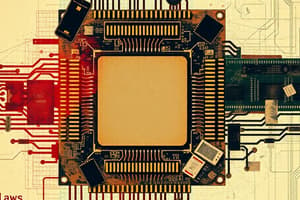Podcast
Questions and Answers
Explain the four main stages of the instruction execution cycle in a computer's CPU.
Explain the four main stages of the instruction execution cycle in a computer's CPU.
The four main stages of the instruction execution cycle are: 1. Fetch (IF - Instruction Fetch): The CPU fetches the next instruction from memory. 2. Decode (ID - Instruction Decode): The CPU decodes the instruction to understand the operation that needs to be performed. 3. Execute (EX - Execution): The actual operation specified by the opcode is carried out. 4. Store (MEM - Memory Write/Read): This stage involves writing data to memory or fetching necessary data for instructions that read from memory.
What does the Decode (ID - Instruction Decode) stage of the instruction execution cycle involve?
What does the Decode (ID - Instruction Decode) stage of the instruction execution cycle involve?
The Decode stage involves extracting the opcode (operation code) of the instruction from the instruction register and understanding the operands and addressing modes that may be decoded during this stage.
During which stage of the instruction execution cycle are arithmetic or logical operations performed?
During which stage of the instruction execution cycle are arithmetic or logical operations performed?
Arithmetic or logical operations are performed during the Execute (EX - Execution) stage of the instruction execution cycle.
What role does the program counter (PC) play in the Fetch (IF - Instruction Fetch) stage of the instruction execution cycle?
What role does the program counter (PC) play in the Fetch (IF - Instruction Fetch) stage of the instruction execution cycle?
When does the cycle of the instruction execution cycle repeat for each instruction processed by the CPU?
When does the cycle of the instruction execution cycle repeat for each instruction processed by the CPU?
Match the stage of the instruction execution cycle with its description:
Match the stage of the instruction execution cycle with its description:
Match the following components with their roles in the instruction execution cycle:
Match the following components with their roles in the instruction execution cycle:
Match the following actions with their corresponding stages in the instruction execution cycle:
Match the following actions with their corresponding stages in the instruction execution cycle:
Match the description with the correct stage of the instruction execution cycle:
Match the description with the correct stage of the instruction execution cycle:
Match the following terms with their respective meanings in the context of instruction execution cycle:
Match the following terms with their respective meanings in the context of instruction execution cycle:
Study Notes
Instruction Execution Cycle
- The instruction execution cycle consists of four main stages: Fetch (IF), Decode (ID), Execute (EX), and Memory Access (MEM) / Write Back (WB)
Fetch Stage (IF)
- The program counter (PC) plays a crucial role in this stage, providing the address of the next instruction to be fetched
- The CPU retrieves an instruction from memory at the address provided by the PC
Decode Stage (ID)
- During this stage, the instruction is decoded, and the necessary operands are identified
- The CPU determines the opcode, operands, and the type of operation to be performed
Execute Stage (EX)
- Arithmetic or logical operations are performed during this stage
- The CPU executes the instruction, using the operands and operation type determined during the Decode stage
Repeat Cycle
- The instruction execution cycle repeats for each instruction processed by the CPU
- The cycle starts again from the Fetch stage, with the PC incremented to point to the next instruction
Component Roles
- Program Counter (PC): provides the address of the next instruction to be fetched
- Opcode: determines the type of operation to be performed
- Operands: data used in the execution of the instruction
Stage Descriptions
- Fetch (IF): retrieves an instruction from memory
- Decode (ID): decodes the instruction and identifies operands
- Execute (EX): performs arithmetic or logical operations
- Memory Access (MEM) / Write Back (WB): accesses memory and stores results
Term Definitions
- Opcode: the part of the instruction that determines the operation to be performed
- Operand: the data used in the execution of the instruction
Studying That Suits You
Use AI to generate personalized quizzes and flashcards to suit your learning preferences.
Description
Test your knowledge of the instruction execution cycle, which is the fundamental process for a computer's CPU to fetch, decode, and execute instructions. Learn about the four main stages: fetch, decode, execute, and store.




